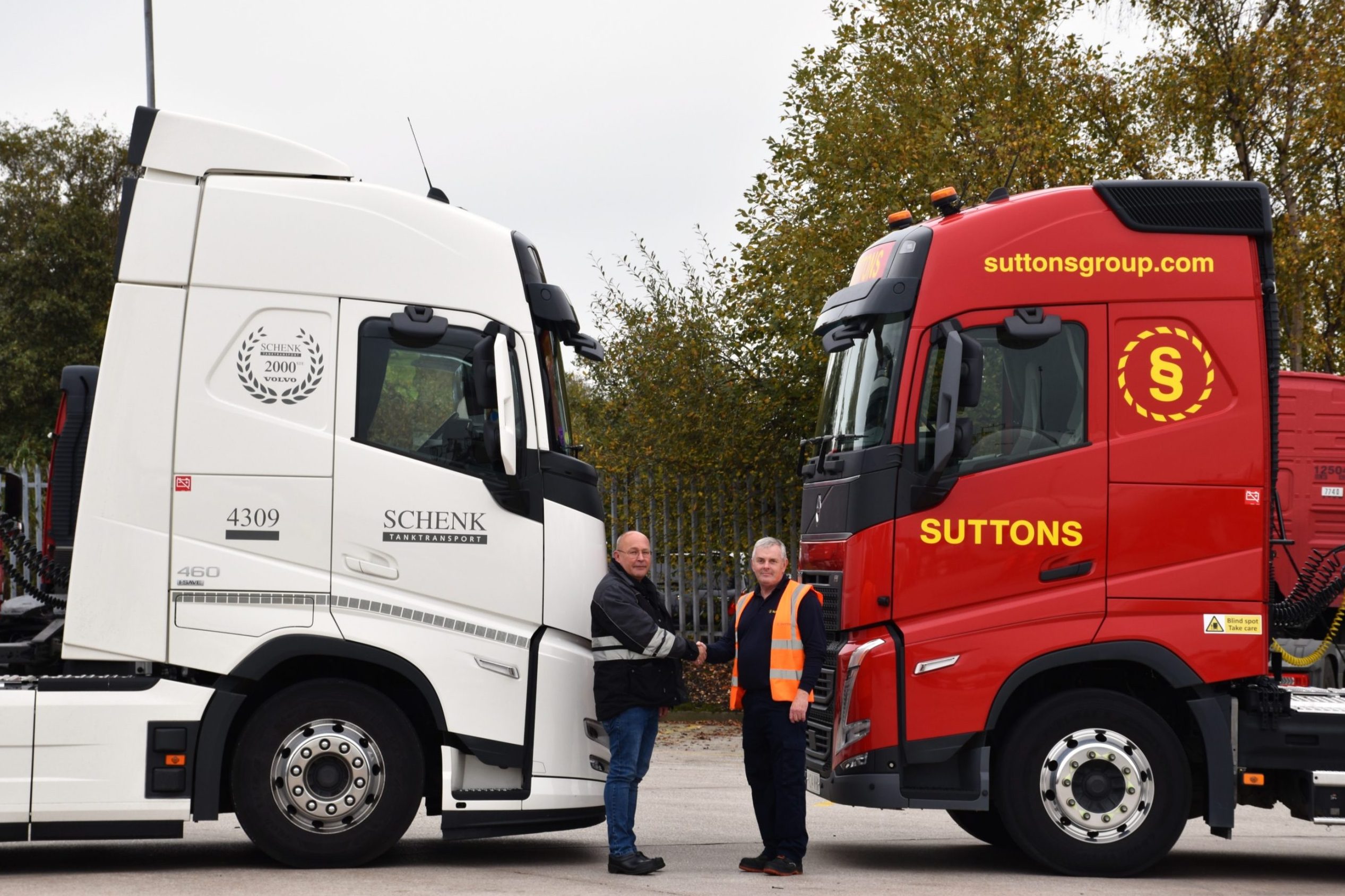
Insights
November 3, 2024
Suttons Tankers Acquired by Schenk Tanktransport: Strategic Implications for the UK and European Chemical Logistics Industry

Insights
November 3, 2024
Suttons Tankers Acquired by Schenk Tanktransport: Strategic Implications for the UK and European Chemical Logistics Industry
Schenk Tanktransport has acquired Suttons Tankers, marking a major expansion in the chemical logistics sector. Explore the strategic implications for the UK and European markets.
In a major development within the logistics sector, Suttons Tankers, a leading UK-based chemical logistics firm, has been acquired by Schenk Tanktransport, a European powerhouse known for its expertise in bulk liquid and gas transportation. This acquisition marks a strategic move by Schenk to enhance its presence in the UK market and expand its service offerings in the competitive chemical logistics sector.
This article delves into the strategic motivations behind the acquisition, the potential benefits for both companies, and the broader implications for the chemical logistics industry, while offering insights and recommendations for stakeholders.
Overview of Suttons Tankers and Schenk Tanktransport
1.1 Background on Suttons Tankers
Suttons Tankers has built a reputation as one of the premier chemical logistics firms in the UK, known for its commitment to safety, reliability, and specialized transport services.
Company Profile:
Established as part of the Suttons Group, Suttons Tankers has decades of experience in bulk chemical transport. The company operates a substantial fleet of tankers and provides services across the UK, catering to clients in the chemical, fuel, and food-grade sectors.
Key Services and Capabilities:
Suttons Tankers offers a range of services, including bulk chemical transportation, hazardous material handling, and on-site logistics solutions. The company is celebrated for its high safety standards and compliance with stringent regulatory requirements.
1.2 Introduction to Schenk Tanktransport
Schenk Tanktransport is a major player in the European logistics landscape, with a strong focus on the safe and efficient transport of liquid and gas chemicals.
Company Overview:
With operations spanning across multiple European countries, Schenk Tanktransport is a leader in the chemical logistics sector. The company operates a modern and technologically advanced fleet, emphasizing safety, environmental compliance, and operational efficiency.
Growth Strategy and Market Position:
Schenk’s acquisition of Suttons Tankers is a strategic move to expand its reach in the UK, which is a crucial market for chemical logistics. The acquisition aligns with Schenk’s long-term vision to become a dominant player in the European chemical transportation industry.
Strategic Rationale Behind the Acquisition
2.1 Schenk's Motivation for the Acquisition
The acquisition of Suttons Tankers by Schenk Tanktransport is driven by strategic goals aimed at growth and market expansion.
Expanding Market Presence in the UK:
The UK remains a vital market for chemical logistics, and having a strong foothold is essential for any company aiming to lead in this sector. By acquiring Suttons Tankers, Schenk gains access to an established network, a strong customer base, and valuable market knowledge.
Diversifying and Enhancing Service Offerings:
Schenk’s service portfolio will be significantly enhanced by Suttons’ specialized capabilities. The acquisition allows Schenk to offer more comprehensive logistics solutions to clients, including hazardous material handling and bulk liquid transport.
2.2 Benefits for Suttons Tankers
While Schenk stands to gain from increased market access, Suttons Tankers will also benefit from this acquisition.
Access to Greater Resources and Capabilities:
Joining forces with Schenk will provide Suttons with access to advanced technology, a broader operational network, and increased investment in fleet and infrastructure. This will enable Suttons to enhance service quality and expand its geographic reach.
Opportunities for Growth and Innovation:
The acquisition creates opportunities for innovation in areas like fleet optimization, digital logistics solutions, and environmental sustainability. Suttons Tankers will be well-positioned to implement new technologies and processes that improve efficiency and safety.
Potential Implications for the Chemical Logistics Sector
3.1 Industry Consolidation and Competition
The acquisition contributes to ongoing trends of consolidation in the logistics industry, which have both positive and negative implications.
Impact on Market Dynamics:
Industry consolidation often leads to increased competition among major players, as companies seek to gain a larger market share. Smaller logistics providers may face added pressure to either compete or collaborate with larger, more resourceful firms.
Opportunities for Collaboration and Efficiency:
On the positive side, consolidation can lead to more efficient and streamlined operations. By leveraging economies of scale, companies like Schenk can offer better pricing and service reliability, benefiting customers and partners.
3.2 Implications for Customers and Supply Chain Partners
The acquisition will have direct and indirect effects on customers and supply chain partners, influencing service offerings and market dynamics.
Enhanced Service Offerings:
Customers will likely benefit from a wider range of services, improved reliability, and access to more advanced logistics technology. This could streamline chemical transportation and make supply chains more efficient.
Potential Challenges and Concerns:
However, there are concerns about service continuity, potential price changes, and how smaller logistics firms will adapt. Customers will need to monitor the integration process to ensure there are no disruptions to their operations.
Challenges and Considerations for Integration
4.1 Cultural and Operational Integration
Merging two established companies is no small feat, and cultural and operational integration will be critical to the acquisition’s success.
Merging Company Cultures:
Suttons and Schenk have distinct corporate cultures, and aligning them will require thoughtful leadership and a strong focus on employee engagement. Effective communication and change management strategies will be essential.
Operational Alignment:
Integrating operational processes, technology systems, and safety standards is complex, especially in the highly regulated chemical logistics industry. Ensuring that both companies’ operations align seamlessly will be a top priority.
4.2 Regulatory and Compliance Factors
The chemical logistics industry is heavily regulated, and the acquisition will have to navigate various regulatory hurdles.
Navigating UK and EU Regulations:
The combined entity must comply with both UK and EU safety and environmental regulations. This may involve rigorous audits, updates to safety protocols, and adherence to cross-border transport requirements.
Impact on Brexit-Related Trade Dynamics:
Brexit has added complexity to UK-EU trade, and the acquisition will need to address potential challenges related to customs, tariffs, and border checks. A well-thought-out strategy will be essential to minimize disruptions.
Strategic Recommendations for Stakeholders
5.1 Recommendations for Logistics and Supply Chain Managers
Supply chain and logistics managers must adapt to the changes brought about by this acquisition and position themselves for success.
Adapting to New Market Conditions:
Stay informed about changes in service offerings and leverage the enhanced capabilities of the combined entity. This may involve renegotiating contracts, optimizing supply chain strategies, and exploring new collaboration opportunities.
Collaborating with Industry Partners:
Building strong relationships with industry partners, including Schenk-Suttons, can help logistics managers navigate the evolving landscape. Collaboration will be key to achieving greater efficiency and innovation.
5.2 Guidance for Industry Stakeholders
Industry stakeholders should take proactive steps to benefit from the acquisition and mitigate any potential risks.
Monitoring Industry Trends and Opportunities:
Keep a close eye on industry trends, such as technological advancements and shifts in customer demands. Understanding these trends will help stakeholders make informed decisions and capitalize on new opportunities.
Engaging in Industry Dialogue:
Participate in industry forums and discussions to stay updated and contribute to shaping the future of the chemical logistics sector. Advocacy for policies that support industry growth and sustainability will be crucial.
Conclusion
The acquisition of Suttons Tankers by Schenk Tanktransport is a transformative event in the chemical logistics industry. By combining their strengths, these two companies aim to set new standards for safety, efficiency, and service excellence. However, the integration process and evolving market dynamics will require careful navigation. Stakeholders who stay agile and proactive will be best positioned to thrive in this new landscape.
Key Takeaways:
The acquisition strengthens Schenk’s presence in the UK and enhances its service offerings in the chemical logistics sector.
Suttons Tankers stands to benefit from greater resources, expanded networks, and opportunities for innovation.
Industry stakeholders must stay agile and adapt to the evolving landscape, seizing opportunities while addressing potential challenges.
How do you see this acquisition impacting the chemical logistics sector? Share your thoughts and insights in the comments below!
In a major development within the logistics sector, Suttons Tankers, a leading UK-based chemical logistics firm, has been acquired by Schenk Tanktransport, a European powerhouse known for its expertise in bulk liquid and gas transportation. This acquisition marks a strategic move by Schenk to enhance its presence in the UK market and expand its service offerings in the competitive chemical logistics sector.
This article delves into the strategic motivations behind the acquisition, the potential benefits for both companies, and the broader implications for the chemical logistics industry, while offering insights and recommendations for stakeholders.
Overview of Suttons Tankers and Schenk Tanktransport
1.1 Background on Suttons Tankers
Suttons Tankers has built a reputation as one of the premier chemical logistics firms in the UK, known for its commitment to safety, reliability, and specialized transport services.
Company Profile:
Established as part of the Suttons Group, Suttons Tankers has decades of experience in bulk chemical transport. The company operates a substantial fleet of tankers and provides services across the UK, catering to clients in the chemical, fuel, and food-grade sectors.
Key Services and Capabilities:
Suttons Tankers offers a range of services, including bulk chemical transportation, hazardous material handling, and on-site logistics solutions. The company is celebrated for its high safety standards and compliance with stringent regulatory requirements.
1.2 Introduction to Schenk Tanktransport
Schenk Tanktransport is a major player in the European logistics landscape, with a strong focus on the safe and efficient transport of liquid and gas chemicals.
Company Overview:
With operations spanning across multiple European countries, Schenk Tanktransport is a leader in the chemical logistics sector. The company operates a modern and technologically advanced fleet, emphasizing safety, environmental compliance, and operational efficiency.
Growth Strategy and Market Position:
Schenk’s acquisition of Suttons Tankers is a strategic move to expand its reach in the UK, which is a crucial market for chemical logistics. The acquisition aligns with Schenk’s long-term vision to become a dominant player in the European chemical transportation industry.
Strategic Rationale Behind the Acquisition
2.1 Schenk's Motivation for the Acquisition
The acquisition of Suttons Tankers by Schenk Tanktransport is driven by strategic goals aimed at growth and market expansion.
Expanding Market Presence in the UK:
The UK remains a vital market for chemical logistics, and having a strong foothold is essential for any company aiming to lead in this sector. By acquiring Suttons Tankers, Schenk gains access to an established network, a strong customer base, and valuable market knowledge.
Diversifying and Enhancing Service Offerings:
Schenk’s service portfolio will be significantly enhanced by Suttons’ specialized capabilities. The acquisition allows Schenk to offer more comprehensive logistics solutions to clients, including hazardous material handling and bulk liquid transport.
2.2 Benefits for Suttons Tankers
While Schenk stands to gain from increased market access, Suttons Tankers will also benefit from this acquisition.
Access to Greater Resources and Capabilities:
Joining forces with Schenk will provide Suttons with access to advanced technology, a broader operational network, and increased investment in fleet and infrastructure. This will enable Suttons to enhance service quality and expand its geographic reach.
Opportunities for Growth and Innovation:
The acquisition creates opportunities for innovation in areas like fleet optimization, digital logistics solutions, and environmental sustainability. Suttons Tankers will be well-positioned to implement new technologies and processes that improve efficiency and safety.
Potential Implications for the Chemical Logistics Sector
3.1 Industry Consolidation and Competition
The acquisition contributes to ongoing trends of consolidation in the logistics industry, which have both positive and negative implications.
Impact on Market Dynamics:
Industry consolidation often leads to increased competition among major players, as companies seek to gain a larger market share. Smaller logistics providers may face added pressure to either compete or collaborate with larger, more resourceful firms.
Opportunities for Collaboration and Efficiency:
On the positive side, consolidation can lead to more efficient and streamlined operations. By leveraging economies of scale, companies like Schenk can offer better pricing and service reliability, benefiting customers and partners.
3.2 Implications for Customers and Supply Chain Partners
The acquisition will have direct and indirect effects on customers and supply chain partners, influencing service offerings and market dynamics.
Enhanced Service Offerings:
Customers will likely benefit from a wider range of services, improved reliability, and access to more advanced logistics technology. This could streamline chemical transportation and make supply chains more efficient.
Potential Challenges and Concerns:
However, there are concerns about service continuity, potential price changes, and how smaller logistics firms will adapt. Customers will need to monitor the integration process to ensure there are no disruptions to their operations.
Challenges and Considerations for Integration
4.1 Cultural and Operational Integration
Merging two established companies is no small feat, and cultural and operational integration will be critical to the acquisition’s success.
Merging Company Cultures:
Suttons and Schenk have distinct corporate cultures, and aligning them will require thoughtful leadership and a strong focus on employee engagement. Effective communication and change management strategies will be essential.
Operational Alignment:
Integrating operational processes, technology systems, and safety standards is complex, especially in the highly regulated chemical logistics industry. Ensuring that both companies’ operations align seamlessly will be a top priority.
4.2 Regulatory and Compliance Factors
The chemical logistics industry is heavily regulated, and the acquisition will have to navigate various regulatory hurdles.
Navigating UK and EU Regulations:
The combined entity must comply with both UK and EU safety and environmental regulations. This may involve rigorous audits, updates to safety protocols, and adherence to cross-border transport requirements.
Impact on Brexit-Related Trade Dynamics:
Brexit has added complexity to UK-EU trade, and the acquisition will need to address potential challenges related to customs, tariffs, and border checks. A well-thought-out strategy will be essential to minimize disruptions.
Strategic Recommendations for Stakeholders
5.1 Recommendations for Logistics and Supply Chain Managers
Supply chain and logistics managers must adapt to the changes brought about by this acquisition and position themselves for success.
Adapting to New Market Conditions:
Stay informed about changes in service offerings and leverage the enhanced capabilities of the combined entity. This may involve renegotiating contracts, optimizing supply chain strategies, and exploring new collaboration opportunities.
Collaborating with Industry Partners:
Building strong relationships with industry partners, including Schenk-Suttons, can help logistics managers navigate the evolving landscape. Collaboration will be key to achieving greater efficiency and innovation.
5.2 Guidance for Industry Stakeholders
Industry stakeholders should take proactive steps to benefit from the acquisition and mitigate any potential risks.
Monitoring Industry Trends and Opportunities:
Keep a close eye on industry trends, such as technological advancements and shifts in customer demands. Understanding these trends will help stakeholders make informed decisions and capitalize on new opportunities.
Engaging in Industry Dialogue:
Participate in industry forums and discussions to stay updated and contribute to shaping the future of the chemical logistics sector. Advocacy for policies that support industry growth and sustainability will be crucial.
Conclusion
The acquisition of Suttons Tankers by Schenk Tanktransport is a transformative event in the chemical logistics industry. By combining their strengths, these two companies aim to set new standards for safety, efficiency, and service excellence. However, the integration process and evolving market dynamics will require careful navigation. Stakeholders who stay agile and proactive will be best positioned to thrive in this new landscape.
Key Takeaways:
The acquisition strengthens Schenk’s presence in the UK and enhances its service offerings in the chemical logistics sector.
Suttons Tankers stands to benefit from greater resources, expanded networks, and opportunities for innovation.
Industry stakeholders must stay agile and adapt to the evolving landscape, seizing opportunities while addressing potential challenges.
How do you see this acquisition impacting the chemical logistics sector? Share your thoughts and insights in the comments below!
Schenk Tanktransport has acquired Suttons Tankers, marking a major expansion in the chemical logistics sector. Explore the strategic implications for the UK and European markets.
In a major development within the logistics sector, Suttons Tankers, a leading UK-based chemical logistics firm, has been acquired by Schenk Tanktransport, a European powerhouse known for its expertise in bulk liquid and gas transportation. This acquisition marks a strategic move by Schenk to enhance its presence in the UK market and expand its service offerings in the competitive chemical logistics sector.
This article delves into the strategic motivations behind the acquisition, the potential benefits for both companies, and the broader implications for the chemical logistics industry, while offering insights and recommendations for stakeholders.
Overview of Suttons Tankers and Schenk Tanktransport
1.1 Background on Suttons Tankers
Suttons Tankers has built a reputation as one of the premier chemical logistics firms in the UK, known for its commitment to safety, reliability, and specialized transport services.
Company Profile:
Established as part of the Suttons Group, Suttons Tankers has decades of experience in bulk chemical transport. The company operates a substantial fleet of tankers and provides services across the UK, catering to clients in the chemical, fuel, and food-grade sectors.
Key Services and Capabilities:
Suttons Tankers offers a range of services, including bulk chemical transportation, hazardous material handling, and on-site logistics solutions. The company is celebrated for its high safety standards and compliance with stringent regulatory requirements.
1.2 Introduction to Schenk Tanktransport
Schenk Tanktransport is a major player in the European logistics landscape, with a strong focus on the safe and efficient transport of liquid and gas chemicals.
Company Overview:
With operations spanning across multiple European countries, Schenk Tanktransport is a leader in the chemical logistics sector. The company operates a modern and technologically advanced fleet, emphasizing safety, environmental compliance, and operational efficiency.
Growth Strategy and Market Position:
Schenk’s acquisition of Suttons Tankers is a strategic move to expand its reach in the UK, which is a crucial market for chemical logistics. The acquisition aligns with Schenk’s long-term vision to become a dominant player in the European chemical transportation industry.
Strategic Rationale Behind the Acquisition
2.1 Schenk's Motivation for the Acquisition
The acquisition of Suttons Tankers by Schenk Tanktransport is driven by strategic goals aimed at growth and market expansion.
Expanding Market Presence in the UK:
The UK remains a vital market for chemical logistics, and having a strong foothold is essential for any company aiming to lead in this sector. By acquiring Suttons Tankers, Schenk gains access to an established network, a strong customer base, and valuable market knowledge.
Diversifying and Enhancing Service Offerings:
Schenk’s service portfolio will be significantly enhanced by Suttons’ specialized capabilities. The acquisition allows Schenk to offer more comprehensive logistics solutions to clients, including hazardous material handling and bulk liquid transport.
2.2 Benefits for Suttons Tankers
While Schenk stands to gain from increased market access, Suttons Tankers will also benefit from this acquisition.
Access to Greater Resources and Capabilities:
Joining forces with Schenk will provide Suttons with access to advanced technology, a broader operational network, and increased investment in fleet and infrastructure. This will enable Suttons to enhance service quality and expand its geographic reach.
Opportunities for Growth and Innovation:
The acquisition creates opportunities for innovation in areas like fleet optimization, digital logistics solutions, and environmental sustainability. Suttons Tankers will be well-positioned to implement new technologies and processes that improve efficiency and safety.
Potential Implications for the Chemical Logistics Sector
3.1 Industry Consolidation and Competition
The acquisition contributes to ongoing trends of consolidation in the logistics industry, which have both positive and negative implications.
Impact on Market Dynamics:
Industry consolidation often leads to increased competition among major players, as companies seek to gain a larger market share. Smaller logistics providers may face added pressure to either compete or collaborate with larger, more resourceful firms.
Opportunities for Collaboration and Efficiency:
On the positive side, consolidation can lead to more efficient and streamlined operations. By leveraging economies of scale, companies like Schenk can offer better pricing and service reliability, benefiting customers and partners.
3.2 Implications for Customers and Supply Chain Partners
The acquisition will have direct and indirect effects on customers and supply chain partners, influencing service offerings and market dynamics.
Enhanced Service Offerings:
Customers will likely benefit from a wider range of services, improved reliability, and access to more advanced logistics technology. This could streamline chemical transportation and make supply chains more efficient.
Potential Challenges and Concerns:
However, there are concerns about service continuity, potential price changes, and how smaller logistics firms will adapt. Customers will need to monitor the integration process to ensure there are no disruptions to their operations.
Challenges and Considerations for Integration
4.1 Cultural and Operational Integration
Merging two established companies is no small feat, and cultural and operational integration will be critical to the acquisition’s success.
Merging Company Cultures:
Suttons and Schenk have distinct corporate cultures, and aligning them will require thoughtful leadership and a strong focus on employee engagement. Effective communication and change management strategies will be essential.
Operational Alignment:
Integrating operational processes, technology systems, and safety standards is complex, especially in the highly regulated chemical logistics industry. Ensuring that both companies’ operations align seamlessly will be a top priority.
4.2 Regulatory and Compliance Factors
The chemical logistics industry is heavily regulated, and the acquisition will have to navigate various regulatory hurdles.
Navigating UK and EU Regulations:
The combined entity must comply with both UK and EU safety and environmental regulations. This may involve rigorous audits, updates to safety protocols, and adherence to cross-border transport requirements.
Impact on Brexit-Related Trade Dynamics:
Brexit has added complexity to UK-EU trade, and the acquisition will need to address potential challenges related to customs, tariffs, and border checks. A well-thought-out strategy will be essential to minimize disruptions.
Strategic Recommendations for Stakeholders
5.1 Recommendations for Logistics and Supply Chain Managers
Supply chain and logistics managers must adapt to the changes brought about by this acquisition and position themselves for success.
Adapting to New Market Conditions:
Stay informed about changes in service offerings and leverage the enhanced capabilities of the combined entity. This may involve renegotiating contracts, optimizing supply chain strategies, and exploring new collaboration opportunities.
Collaborating with Industry Partners:
Building strong relationships with industry partners, including Schenk-Suttons, can help logistics managers navigate the evolving landscape. Collaboration will be key to achieving greater efficiency and innovation.
5.2 Guidance for Industry Stakeholders
Industry stakeholders should take proactive steps to benefit from the acquisition and mitigate any potential risks.
Monitoring Industry Trends and Opportunities:
Keep a close eye on industry trends, such as technological advancements and shifts in customer demands. Understanding these trends will help stakeholders make informed decisions and capitalize on new opportunities.
Engaging in Industry Dialogue:
Participate in industry forums and discussions to stay updated and contribute to shaping the future of the chemical logistics sector. Advocacy for policies that support industry growth and sustainability will be crucial.
Conclusion
The acquisition of Suttons Tankers by Schenk Tanktransport is a transformative event in the chemical logistics industry. By combining their strengths, these two companies aim to set new standards for safety, efficiency, and service excellence. However, the integration process and evolving market dynamics will require careful navigation. Stakeholders who stay agile and proactive will be best positioned to thrive in this new landscape.
Key Takeaways:
The acquisition strengthens Schenk’s presence in the UK and enhances its service offerings in the chemical logistics sector.
Suttons Tankers stands to benefit from greater resources, expanded networks, and opportunities for innovation.
Industry stakeholders must stay agile and adapt to the evolving landscape, seizing opportunities while addressing potential challenges.
How do you see this acquisition impacting the chemical logistics sector? Share your thoughts and insights in the comments below!
Other Blogs
Other Blogs
Check our other project Blogs with useful insight and information for your businesses
Other Blogs
Other Blogs
Check our other project Blogs with useful insight and information for your businesses
Other Blogs
Other Blogs
Check our other project Blogs with useful insight and information for your businesses


